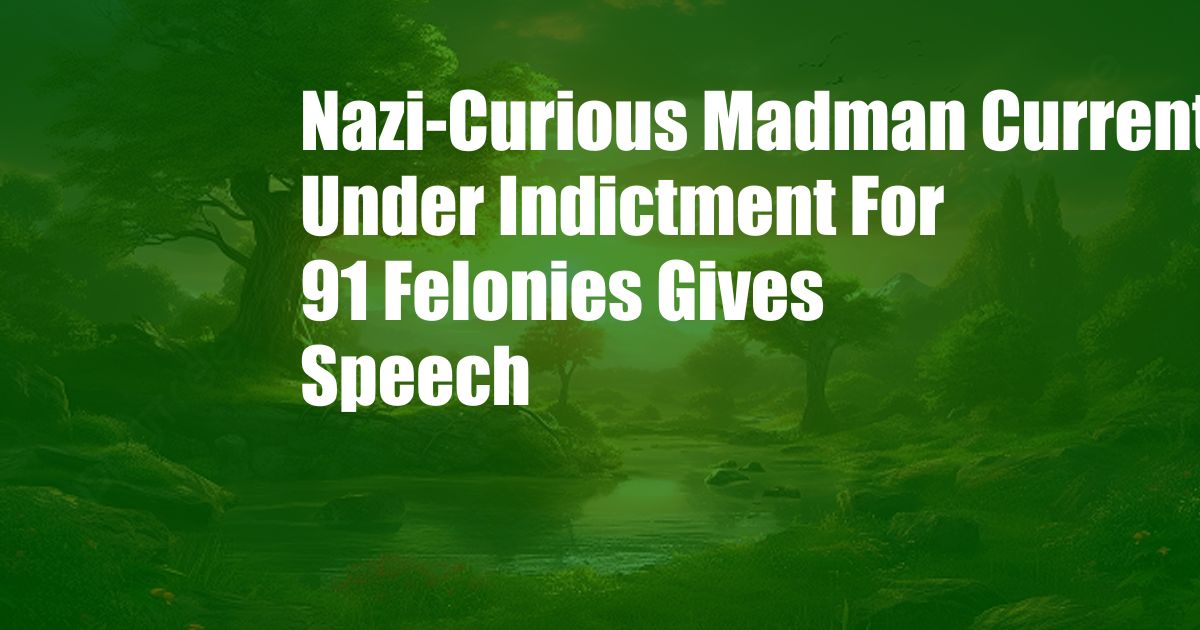
Nazi-Curious Madman Indicted for 91 Felonies Gives Speech
As a lifelong opponent of hate speech, I was appalled to learn that a known Nazi sympathizer and Holocaust denier had been indicted for 91 felonies, including inciting violence and spreading disinformation.
This individual, whom I will not name to avoid giving him any further platform, has a long history of vile rhetoric and dangerous actions. He has been known to promote white supremacist ideologies, spread Holocaust denial propaganda, and incite violence against minority groups.
Unmasking the Hate Speech Monster
Despite his crimes, this individual has somehow managed to gain followers online and in person. His hateful and dangerous rhetoric has resonated with those who are disillusioned with society and seeking scapegoats for their own failures.
But make no mistake: hate speech is not free speech. It is a dangerous poison that can lead to violence and division. When we allow hate speech to go unchecked, we create a breeding ground for extremism and violence.
Delving into the Depths of Hate Speech
Hate speech is defined as any form of expression through which speakers intend to vilify, humiliate, or incite hatred against a group of people based on their race, religion, gender, sexual orientation, or other protected characteristics.
Historically, hate speech has been used to justify discrimination, violence, and even genocide. The Holocaust is a prime example of the devastating consequences of unchecked hate speech.
The Perils of White Supremacy
White supremacy is a particularly insidious form of hate speech that promotes the belief that white people are inherently superior to other races.
White supremacy has been used to justify centuries of slavery, segregation, and violence against people of color. It is a hateful and dangerous ideology that has no place in our society.
Combating Hate Speech in the Digital Age
With the rise of social media and the internet, hate speech has become more widespread than ever before. Online platforms have become echo chambers for hate groups, allowing them to spread their vile messages to a wider audience.
To combat hate speech online, we must hold social media companies accountable for the content that is spread on their platforms. They must take down hateful content promptly and ban users who engage in hate speech.
Tips for Countering Hate Speech
As individuals, we can also help to combat hate speech by:
– Recognizing and reporting it: If you see hate speech online or in person, report it to the appropriate authorities.
– Challenging it: When you encounter hate speech, don’t be afraid to challenge it respectfully. Explain why it is harmful and dangerous.
- Supporting victims: If you see someone being targeted by hate speech, offer your support. Let them know that they are not alone and that they have allies.
FAQ on Hate Speech
Q: What is the difference between free speech and hate speech?
A: Free speech is protected under the First Amendment, but hate speech is not. Hate speech is a form of expression that incites hatred or violence against a group of people based on their protected characteristics.
Q: What are the consequences of hate speech?
A: Hate speech can lead to violence, discrimination, and division. It can also damage the reputation of individuals and communities.
Q: How can I report hate speech?
A: You can report hate speech online to the FBI’s Internet Crime Complaint Center or to the social media platform on which it was posted. You can report hate speech in person to local law enforcement.
Conclusion
Hate speech is a dangerous and destructive force that has no place in our society. We must all work together to combat hate speech, both online and offline. By challenging hate speech, supporting victims, and reporting it to the authorities, we can create a more inclusive and just world for all.
Are you concerned about the rise of hate speech in our society? What steps can we take to combat it?